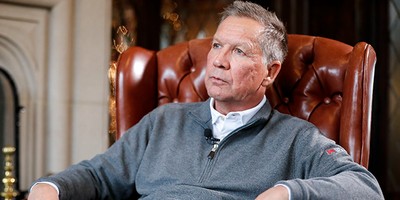The shooting of U.S. Rep. Gabrielle Giffords and 19 other people leaves us speechless.
It also reminds us that the veneer of civilization is very thin and can be pierced in the most despicable and appalling ways.
In October, 2002 two men went on a shooting spree in the National Capital region, killing ten people and wounding three over a span of 10 days.
The region was paralyzed from Richmond, Virginia to Baltimore, Maryland as people worried about being shot while pumping gas, walking into a box store or, in the case of a 13-year-old boy who was shot, walking into school.
The calamity in Arizona doesn't, as some have said, "happen all too often." If it did, it would not be as eyes-wide, mouth-agape, head-shakingly shocking as this incident has been.
That's the bad. And, it's very bad.
In order to get to Nairobi, Kenya (where I am on a trip with the ONE Campaign) we flew from Washington's Dulles airport to Amsterdam and then from Amsterdam to Nairobi.
That was supposed to be the routing.
Sometime in the middle of the night, somewhere over the middle of the Atlantic Ocean, a call went over the PA in the KLM jetliner asking if there was a doctor on board.
Turns out there was. And that doctor spent the next two hours with an 86-year old physician who was in cardiac distress. His name is Tony Rizzo and he is a physician in the United States Army. A colonel, by rank. A doctor by calling.
Dr. Rizzo moved the elderly man to the seat directly in front of mine, hung an IV bag from the curtain rod separating our cabin from the galley, constantly monitored his blood pressure, declined my offer of nitros, but accepted my offer of 81 mg aspirin, went to the flight deck and convinced the captain to put down at Shannon.
Recommended
Which we did. The man, his terribly frightened wife, his daughter and son-in-law were escorted off the flight in the company of an Irish doctor and an ambulance crew.
I have no doubt that Col. Rizzo saved that man's life.
That's the good, and you had seen the calm, professional way in which Dr. Rizzo dealt with the situation you would agree it was very good.
On our first day in Nairobi, we went to visit a slum area. Not just a slum but a place called Kibera which, with some one million inhabitants, is the largest in Kenya. We went visit with a non-governmental agency (NGO) which works exclusively with young people in Kibera - from four years old to late teens.
They run pre-schools and kindergartens. They run libraries. They run a free internet café, they run "health education" clinics for pubescent boys and girls, they run a soccer team to build a sense of community, they run a recycling center, and they run a car wash.
When we were told we were visiting a car wash, I pictured an establishment in Alexandria, Virginia where you get out of your car and guys vacuum, do the tires, then send your care though with waves of felt strips tickling the dirt off aided by colored soap being driven by water being sprayed through high-pressure nozzles.
The car wash is one of the "Slums Information Development and Resource Centers" - the name of the NGO - principal money makers. People pay about 200 Kenyan Shillings ($2.50 USD) and the young men doing the washing keep the lion's share, a piece goes to the NGO to help pay for the other programs.
There is nothing pretty about the car wash in Kibera. It is just a small area off the main road. The water comes from a well into which they take turns dipping a large yellow bucket. On a good day they might wash 18 cars.
That and the recycling center along with a few grants from abroad, helps them help upwards of three hundred young African children a year. They've been at it for 15 years.
I don't know if they're making a dent or not. But I do know that in the midst of a vast, dusty, hot, garbage-strewn slum, they give a few children some hope.
It's ugly, but they're working on making it less so; one young African child at a time.
That's the good, the bad, and the ugly. The lesson? The veneer of civilization is very thin, indeed. But for every beltway sniper or Arizona assassin, there are thousands of people like Col. Rizzo and the grownups in Kibera working every day to help keep that veneer which does defines civilization, stay as polished and beautiful as they can.
God bless them.
























Join the conversation as a VIP Member